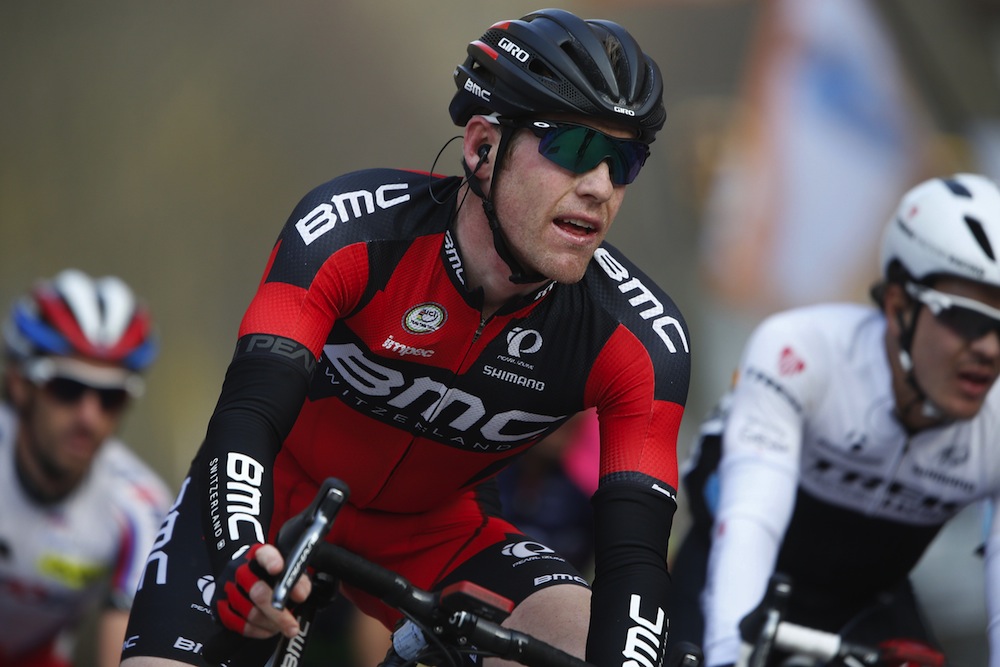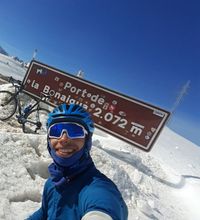Brent Bookwalter in 'stable and non-critical' condition after crashing into parked car at Tour of Britain
Brent Bookwalter, the BMC Racing rider who crashed into a parked car on stage four of the Tour of Britain, has "mild concussion" but is in a "stable and non-critical condition" in hospital

Brent Bookwalter in action during Stage 4 of the 2015 Tirreno-Adriatico

BMC Racing’s Brent Bookwalter is in a stable and non-critical condition in hospital after crashing into a parked car on stage four of the Tour of Britain.
Bookwalter was near to the front of the peloton with 45km remaining of the fourth stage on Wednesday, when he, his team-mate Silvan Dillier, and a number of other riders rode into a car that was parked in a disabled bay in Retford.
>>> Watch: BMC rider taken to hospital after crashing into parked car at Tour of Britain
A marshal was waving a flag to make riders aware of the car that was parked just after a bend. However, Bookwalter was unable to prevent himself from careering into the obstacle and came off the worst.
He was “treated immediately at the scene and taken to hospital by race medical staff and is in a stable and non-critical condition with mild concussion, lacerations and bruising,” a spokesperson from race organisers SweetSpot said.
SweetSpot confirmed that they are "investigating thoroughly", and explained that the car – which had its rear window smashed – "wasn’t able to be moved before the arrival of the race and as per our procedure, was flagged by one of our motorcycle marshals to alert riders to an obstacle in the road.
"We operate a rolling road closure and cannot remove every parked vehicle on the race route. However, we work with residents, communities and local authorities ahead of the event to ensure as safe and clear a passage for the race as possible."
The latest race content, interviews, features, reviews and expert buying guides, direct to your inbox!
>>> Fernando Gaviria holds off Elia Viviani to win Tour of Britain stage four sprint finish
Stefan Küng, Bookwalter’s teammate, was pragmatic in the aftermath of the race, saying that crashes are part of the sport.
"You cannot move every car away," the Swiss rider said. "It was a really unfortunate event. It can happen everywhere and you cannot avoid it completely. There will always be crashes.
"In the end, it’s the riders who make the race so it’s also the riders who cause the crash. In my opinion, I’d say to all riders to indicate a little bit more, just put your hand up or something. If you’re in tenth position you’re blind; you are just following, so if the guy in front of you goes down, you also go down."
>>> Two riders disqualified from Tour of Britain for riding on pavement to attack from bunch
Dillier, sporting cuts and grazes to his palm and knuckles, said: "For sure it is not funny. I don’t think the organisation tried to make a crash; I hope they do their best to avoid stuff like this in the future."
SweetSpot added: “The Nottinghamshire stage was a huge success and while we do not wish for this incident to take the shine off a great day, we take it very seriously indeed and will investigate thoroughly ensuring any lessons learnt are implemented immediately.
“We invest in and take very seriously the safety of competitors and spectators so are naturally disappointed by any negative incidents such as today’s.”
Küng also took time to praise the marshals. He said: "I have to say that, in general, here the race organisers indicate pretty good on all the corners, all the cars, the road islands. It was just really unfortunate."
A freelance sports journalist and podcaster, you'll mostly find Chris's byline attached to news scoops, profile interviews and long reads across a variety of different publications. He has been writing regularly for Cycling Weekly since 2013. In 2024 he released a seven-part podcast documentary, Ghost in the Machine, about motor doping in cycling.
Previously a ski, hiking and cycling guide in the Canadian Rockies and Spanish Pyrenees, he almost certainly holds the record for the most number of interviews conducted from snowy mountains. He lives in Valencia, Spain.
